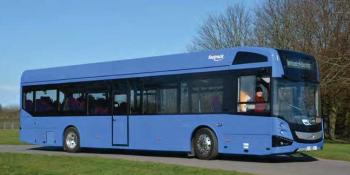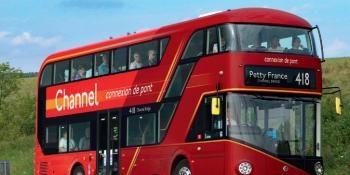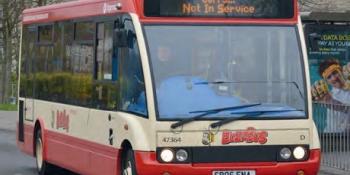Welsh infrastructure secretary Ken Skates says he is open to creating a Better Bus Fund for Wales — emulating the grants that have brought electric, hybrid and gas buses to parts of England and Scotland — but has yet to explain when or how this would be funded.
Skates was speaking at the Welsh Bus Summit, which he convened in Wrexham to address the future of the industry in the principality. He left the summit soon after making his opening speech, but during media interviews beforehand said he had been impressed with a Wright Street Air electric bus, one of four demonstration vehicles at the summit venue.
He also accepted that facilities and information at many bus stops in Wales are inadequate. ‘Moving to real-time information (RTI) isn’t the huge leap that it once was. It should be an expectation rather than a luxury.’
He says the Cardiff government is funding Powys Council to improve stops along the T4 TrawsCymru route between Newtown and Brecon, and that this should include RTI. All Welsh railway stations, including remote rural halts, have electronic information displays but RTI is absent from many urban bus stops, including some locations where equipment was installed under previous capital programmes.
Shortly after the summit, he announced an £85,000 grant for Flintshire Council to ‘develop bus and active travel projects along the B5129 at Queensferry and to Deeside Industrial Park in order to improve transport links to key employment sites’.
This is a prelude to the North Wales Metro project announced by Labour politicians before the assembly elections last year. Despite its title, it is specifically for northeast Wales, where cross-border roads are often congested and public transport has a low modal share for commuting.
The Welsh Government has been talking of a £700million south-east Wales Metro investment programme for several years, and has now earmarked £50million over the next four years for North Wales Metro. Both programmes are intended to cover rail, bus and potentially light rail.
The summit also heard strong messages about the threat that traffic congestion poses to the viability of bus services in Wales.
Transport consultant Chris Cheek presented figures showing how slower journey times increase operating costs for a given service frequency on an urban route. ‘The productivity of Welsh bus staff has fallen by 20% since 2005, ’ he says. His colleague Chris Martin says journey times increased by 50% between 1966 and 2016, encouraged more people to switch to cars, which worsened congestion. Areas outside Wales have shown that the vicious circle can be reversed by accelerating bus journeys at the expense of cars, he adds.
Delegates hearing the message at the summit included senior Welsh Government officers and local government representatives.
When the Cardiff government previously earmarked £13million of capital grants for bus priority in south-east Wales, most of the grants went to council schemes to reduce journey times for all traffic, rather than buses specifically.




